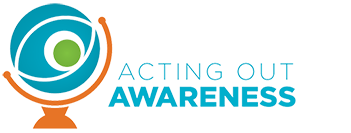My name is Katherina Barguil, and I was fortunate enough to be a facilitator for the 2016 Acting Out Awareness Camp held in Drigari.
I should perhaps begin at the point where everything I’d been planning with my group of kids went down the drain.
Kuite had emptied out.
During the weeks preceding the AOA Camp in Drigari the community of Kuite had experienced a mass exodus of teenagers; all the kids I’d started to talk to about the camp were leaving, heading out and taking temporary jobs just before the start of the new academic year.
There were some kids who were still around, albeit mildly interested in attending a camp only twenty-five minutes downriver and concerning topics like potable water and handwashing that have characterized the community’s eight-year relationship with Peace Corps. Revealing that HIV would also be addressed throughout the camp roused the most interest among the Kuite kids, who were largely composed of a more conservative demographic; it also became a major contention point with a couple of parents who felt that talking about HIV meant exposing their children to inappropriate material.
While these conversations were difficult to have at times, I believe that having gone through this process with parents and children strengthened my relationship with these families; it was an opportunity to grow as a volunteer and into a person community members could trust with their children.
I waited two hours for all the kids who had signed up for the pre-camp charla portion. The three girls in the group waited with me, and while I was disappointed it allowed me the opportunity to discuss with them how they felt talking about HIV around the boys who would be attending; it made the actual charlas, which occurred the third time around, more inclusive and more comfortable for all those present.
Kuite was without water during this time, so the potable water charla allowed us to disinfect a bucket of water from the river. It allowed for kids to reflect on water storage practices in their households, and gave them an opportunity to self-evaluate. For the hand-washing charla we played with glitter and talked about disease transmission; overall it was very entertaining and reinforced a lot of information that had been passed on to them over the years.
The third charla on HIV/AIDS was entirely new ground for the group, and initially everyone was quiet. Each kid was nervous to be seen as someone who knew too much about the topic; among the girls there was a fear that knowledge about the topic implied sexual promiscuity. Some boys with a religious association were nervous for similar reasons. The interactive activities in this charla were key in dispelling this tension; first showing how HIV/AIDS affects the body’s antibodies and defensive mechanisms through a game helped the kids understand the difference between HIV and AIDS and got them thinking about the personal health implications. Afterwards we played a guessing game about HIV transmission and this helped to dispel a lot of erroneous information.
Camp itself was full of surprises. Throughout it I saw so many of the Kuite kids excited to realize how much they knew; their acting was superb, and as a facilitator and director I had a fantastic time seeing them perform without restraint, progressively more and more shame-free throughout the week.
All they want to do is present their dance and their plays to the community (performance coming soon!), and at least once a week I can hear “Bailando” playing from a phone underneath my house, urging me to go wash my hands, reminding me that in these kids there is so much potential for community education. I’m truly excited to see what these teenage health educators have in store for all of Kuite!
Katherina Barguil
